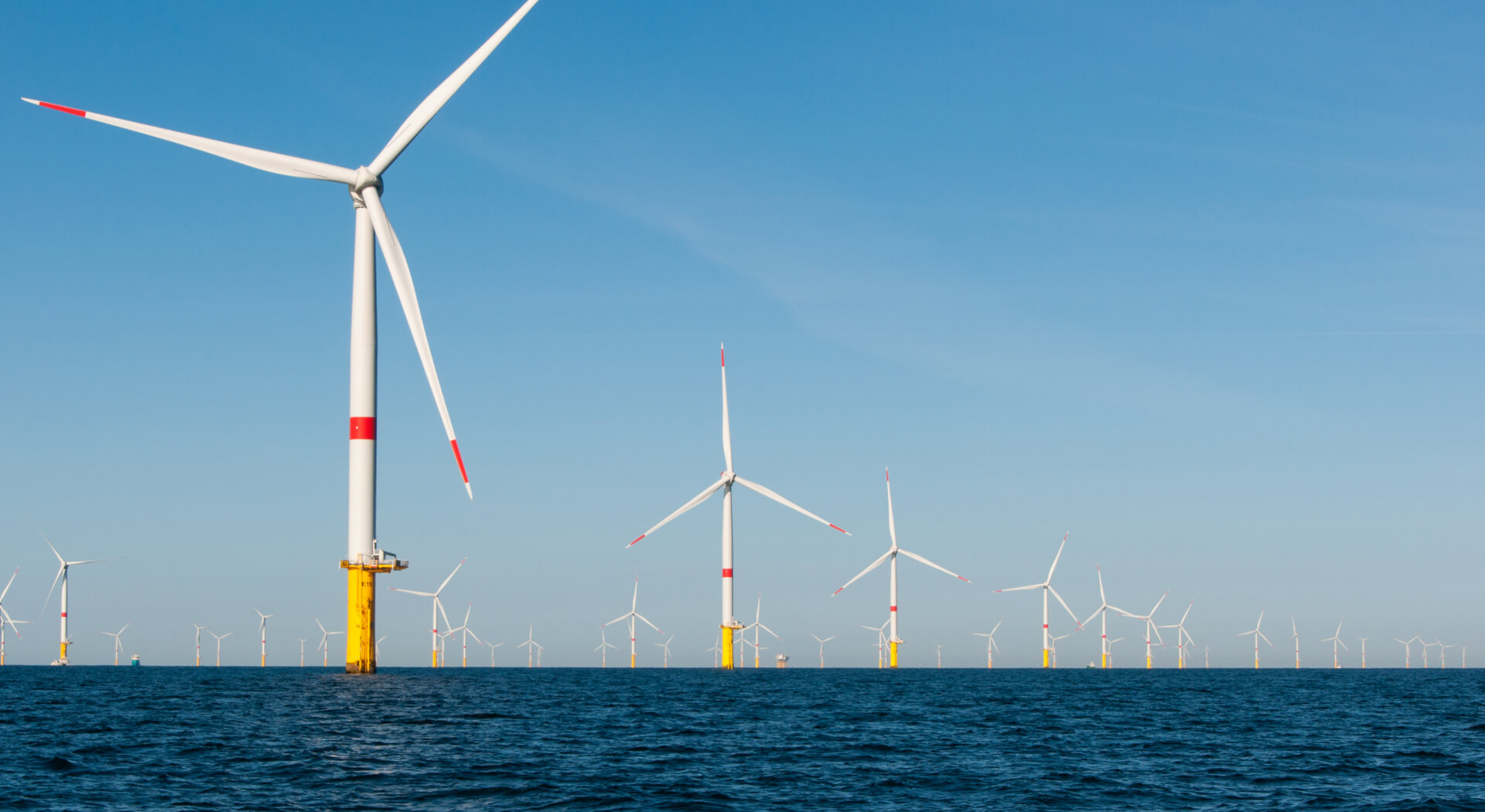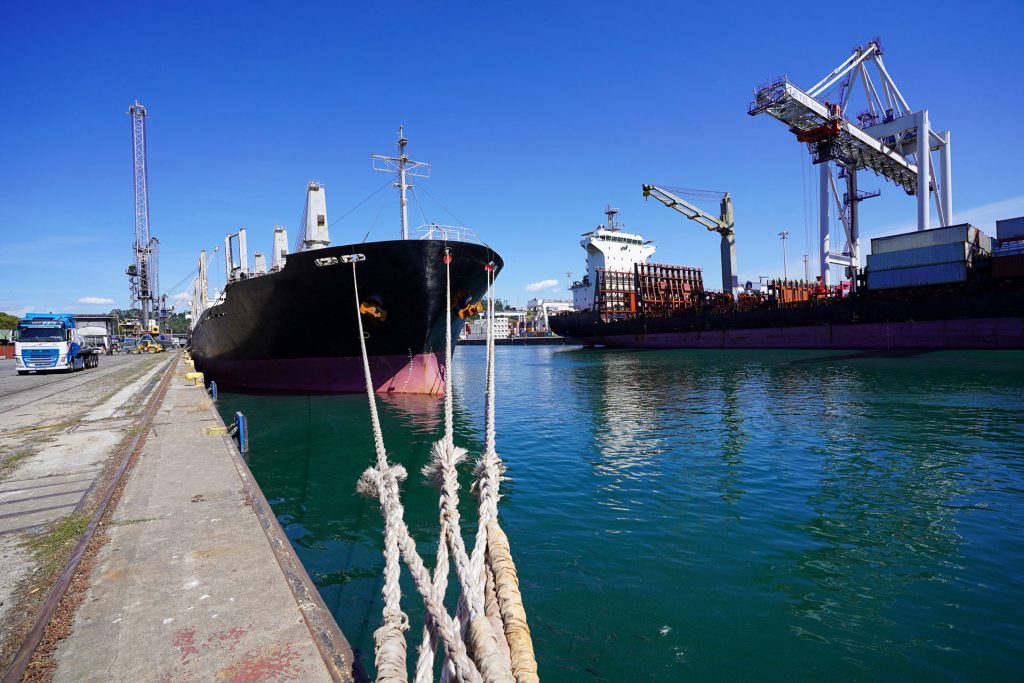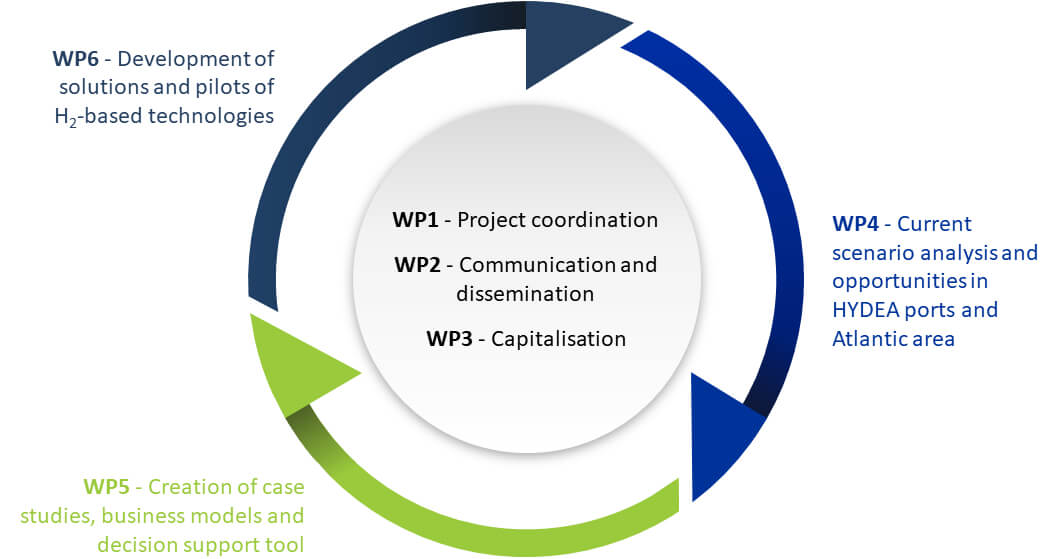About

Context
Contributing to net zero emission European objective by 2050
To be the world’s first net-zero emissions area by 2050, the European Union has set out a plan to put us on the path to a green transition. The European Green Deal aims to reduce emissions by 55% compared to 1990 levels by 2030, and one of the areas that is attracting attention for its transformative potential is the maritime sector, as a crossing point for people, goods, and different modes of transport. Although ports are best known as interconnection points within the maritime transport network, they are also multimodal nodes, industrial areas and commercial sites that play a key role in this decarbonisation process.
Ports can act as drivers of this energy transition from two points: as promoters of a more sustainable port activity and maritime transport, and as a link in the maritime-port clusters, where ports interact with agents from the different value chains, with common objectives and interests. For all these reasons, the Atlantic ports are positioned as an excellent testing platform that will allow the application of the results in the different sectors, thus strengthening their competitiveness and decarbonisation.
Addressing wider strategies and policies
The Blue Economy
Often close to vulnerable natural ecosystems, ports are in a privileged position to rise to the environmental challenge and lead the transition to a sustainable blue economy, by reducing their carbon footprint and becoming testbeds for tomorrow’s energy solutions.
The project proposes to identify challenges and opportunities, develop innovations, new value chains around the port understood from a business analysis perspective and generate a quadruple helix network that enhance policy dialogue and project-oriented collaboration related to scaling up the production and use of green hydrogen and hydrogen-based fuels in industrial coastal areas.In this way, through the achievement of the Blue Growth objectives -innovative and greener ports- it will be contributing to the achievement of the United Nations sustainable development goals.
The Marine Strategy
The contribution of this project to The Marine Strategy Framework Directive referring to the protection and preservation of the marine environment refers mainly to the use of hydrogen as a substitute for fossil fuels in maritime transport or its use in the operations themselves in port infrastructures.
In this regard, it should be said that green hydrogen, which is generated from renewable energy is 100% sustainable, does not emit polluting gases either during combustion or during the production process. Hydrogen in combustion operations or in its use in a fuel cell only generates water vapor, it does not generate greenhouse gases, therefore, it is not harmless to water or air.
The Hydrogen Strategy
To achieve climate neutrality, the European Commission has underlined two aspects: eradicating pollution and reducing dependency on fossil fuels. To achieve both, the continent is in the process of transforming its energy system, currently responsible for 75% of carbon emissions.
Here is where hydrogen plays an important role. In favour of setting the path for how hydrogen can be used for this purpose, and to make a first step towards setting the regulatory framework for a European hydrogen market, on 8 July 2020 the EU issued its hydrogen strategy for a climate-neutral Europe.
This EU Hydrogen Strategy focuses on hydrogen produced from renewable energy sources, so called green hydrogen. In this sense, HYDEA project deals only with green hydrogen-based solutions, from marine energies and other renewable sources, resulting in zero CO2 emissions. Also, the strategy emphasises the potential of ports to use and develop hydrogen.
Objectives
Boosting the hydrogen transition in the Atlantic area ports
The HYDEA project was created to accelerate the development and application of technologies based on the use of green hydrogen as an energy alternative in different types of fleets and vehicles, thus taking another step forward in research for the development and application of alternatives to current energy sources. Green hydrogen comes from renewable energies with zero CO2 emissions, which makes it a clean, sustainable fuel with a zero-pollution index, making it a key agent for the decarbonisation of society in general, and ports in particular.

Making green hydrogen a viable solution
The main objective of the project is to assess, develop and promote the use of technologies based on green hydrogen from renewables like marine energy in Atlantic area ports. This is articulated through the achievement of several specific objectives, which will address the following challenges:
1
Promoting a clear role of hydrogen in the strategic energy plans of ports
2
Increasing knowledge on various hydrogen production technologies that are viable for use in ports
3
Implementing technology demonstrators to attract investor interest in viable business models
Information, decision-making tools, discussion, planning, and innovation
Above the overall goal of HYDEA, the project has 5 specific objectives:
Providing information on the potential of hydrogen in the European Union and decarbonization of ports. A complete analysis will be carried out on the most attractive technologies, barriers, and opportunities in port systems, reinforced with environmental assessments of case studies.
Facilitating informed decision-making by proposing portfolio of case studies from a techno-economic and environmental point of view, and a tool that collects the knowledge generated throughout the project to help in the selection of solutions according to the needs raised by ports.
Stimulating joint discussion on current and future port needs on hydrogen that result in new projects, solutions, and businesses. This open collaboration framework is intended to be generated through the creation of a community as a meeting point.
Guiding the port sector on the path towards the integration of green hydrogen. Individual action plans will be developed for the HYDEA ports and a roadmap will be prepared for the Atlantic area, to guide the actions of the ports and policymakers to the hydrogen era.
Developing innovative solutions adapted to ports and supporting small and medium-sized enterprises to get involved in the hydrogen ecosystem. Hydrogen-based solutions and pilots will be developed in real conditions and third parties will be invited to test their solutions.
Structure

WP1 – Project coordination
This work package has the objective to ensure that a proper coordination across tasks and partners is maintained to achieve the overall project objectives within time, quality and budget constraints and Atlantic area Programme’s requirements.
The activities to be performed are :
- Preparing a management kit containing a project management plan, a data management plan, a gender action plan and a risk management, monitoring, and control plan
- Verifying expenditure and project reporting
Partners involved: All – Leader: EnergyLab
Associated deliverables:
WP2 - Communication and dissemination
The main objective of this work package is to maximise the project impacts on the use of green H2-based technologies with renewable energies in Atlantic area ports. It sets the framework for communicating knowledge produced in the other work packages with target groups.
The activities to be performed are :
- Developing a communication and dissemination strategy and associated plan, and yearly reporting
- Engaging stakeholders through communication
- Encouraging institutional stakeholders
- Supporting the port and regional authorities
- Ensuring industrial dissemination of the project results
- Guaranteeing scientific dissemination of the project results
Partners involved: All – Leader: France Energies Marines
Associated deliverables:
WP3 - Capitalisation
The main objective of this work package is to guarantee sustainability and that the project outputs will be used after the project lifetime.
The activities to be performed are :
- Developing a HYDEA community of entities from the entire hydrogen value chain from the tertiary sector, academics, or industry, as well as from the public administrations
- Transferring knowledge, best practices, and hydrogen innovations
- Preparing action plans for HYDEA ports
- Developing a roadmap for the implementation of hydrogen in the Atlantic area ports
Partners involved: All – Leader: Port of Vigo
Associated deliverables
D3.1.1a – 1st annual report HYDEA Community
D3.3.1 – Guidelines for preparing hydrogen action plan for ports
WP4 - Current scenario analysis and opportunities in HYDEA ports and Atlantic area
The main objective of this work package is to approach and plan strategies at individual and Atlantic area level that will pave the way for future challenges within the hydrogen economy in ports.
The activities to be performed are:
- Mapping of hydrogen initiatives present and planned in Atlantic area ports
- Identifying most promising hydrogen applications and benefits
- Identifying bottlenecks and possible measures
- Identifying opportunities in HYDEA ports
Partners involved: All – Leader: University of Porto
Associated deliverables:
WP5 - Creation of case studies, business models and decision support tool
The main objective of this work package is to define hydrogen use cases in ports, determine its potential energy contribution to balancing renewable energy within each region, the availability of industrial providers to satisfy port requirements and the political commitment towards ports decarbonisation.
The activities to be performed are:
- Defining case studies for each HYDEA port (Spain, Portugal, France, Ireland)
- Assessing each case study technically, economically, environmentally, and socially
- Developing new hydrogen services and port business models
- Developing a decision support tool to facilitate selection of hydrogen technologies
Partners involved: All – Leader: France Energies Marines
Associated deliverables
WP6 - Development of solutions and pilots of hydrogen-based technologies
The main objective of this work package is to demonstrate that ports can host a variety of green hydrogen infrastructure assets, reflecting their unique and varied role within the green and low-carbon hydrogen ecosystem.
The activities to be performed are:
- Setting up different demonstration activities in Spain, Portugal, France and Ireland.
- Supporting other agents to test and/or develop their technologies and hydrogen business models
Partners involved: All – Leader: EnergyLab